Among all the other reasons, water condensation is the primary cause behind this exhaust water leakage issue. Also, the catalytic converter might cause the same issue for your car engine as well. If these are the reasons behind your problem, you will not have to worry about anything.
But if the leakage is caused by a blown head gasket, faulty piston or rings, or faulty EGR cooler, then you might have to take immediate action to prevent further damage. To know more about why my exhaust leaks water, keep digging further.
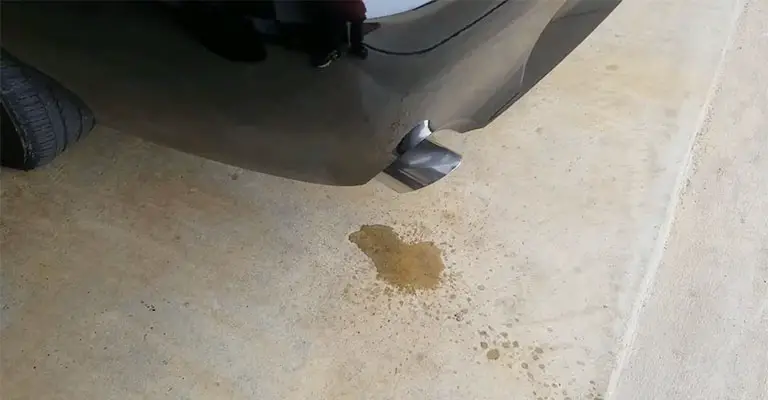
Why Does My Exhaust Leak Water?
During the combustion process, the internal combustion engine of your car releases exhaust gases through its built-in exhaust system. This exhaust system simply refers to a piping system that allows the exhaust gases to flow out of the engine to the atmosphere and through the tailpipe.
So as you can see, the exhaust gases are not supposed to be stuck in your engine. However, sometimes you might notice that water is leaking through the tailpipe which is supposed to exhaust gas only.
It means that the exhaust system must have water in it. And that is not something you will have to worry about a lot. Because leaking water does not indicate that there is a serious issue with your engine.
But since it is not a regular event, it would be better if you look for the reasons behind this leakage issue. Thus, if the signs seem to be wrong to you, you can take immediate action by yourself or with some professional’s assistance.
This way you can also prevent further damage to the engine as well. However, if everything is alright, you will get to save the money that you were about to spend on the mechanic.
So let’s talk about the other probable causes and signs that can cause the leakage issue.
Water Condensation
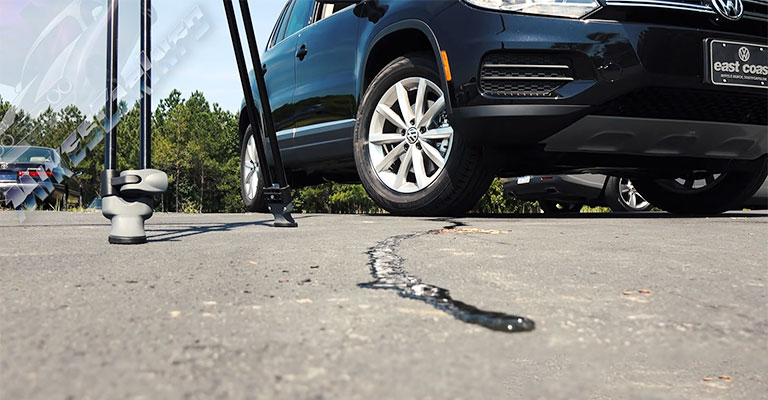
Among all the other causes, water condensation is the key reason why the exhaust system or the tailpipe leaks water. What happens here is, that several types of gases form during the internal combustion process. Some of these gases or pollutants are water (vapor), carbon dioxide, and nitrogen.
So while you are driving the car, you will only see smoke or vapors coming out of the exhaust system. At the same time, a mixture of water vapor and carbon dioxide will be produced.
And then when the engine is turned off and cooled down, the mixture of water vapor and other gases gets condensed into water. Afterward, the condensed water flows out of the exhaust pipe. This water leaking should just stop in just a few minutes.
If that is the case for your car, then you do not have to worry about anything. And clearly, there is nothing wrong with your car’s engine or the exhaust system.
Catalytic Converter Condensation
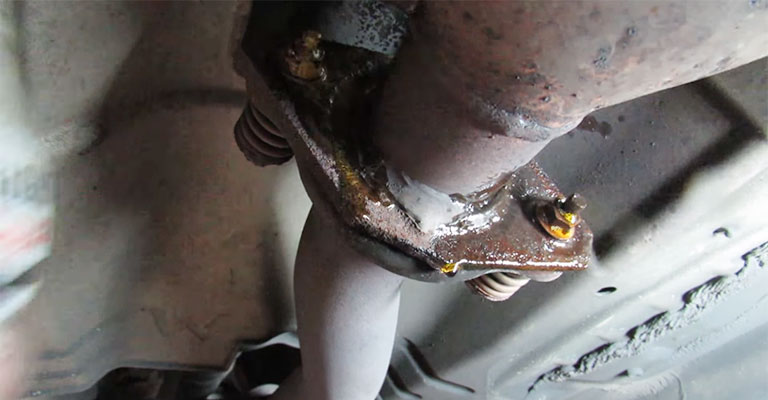
The catalytic converter is a part of the internal combustion engine that changes the chemical configurations of the gases and forms more water molecules. This way the catalytic converter prevents pollution by reducing the harmful gases that comes out of the exhaust system.
So the water that is leaking from your exhaust system can be because of the catalytic converter as well. And nothing to worry about here.
Heated Engine
When you start the engine before you start to drive, the engine can get heated a lot because the oil needs time to properly circulate and lubricate the component of the engine. And only then the temperature can decrease.
But up until then, the high temperature will also heat the exhaust system. So if you are driving in a country with cold weather, the excess temperature in the exhaust system will form the water vapor in it.
After the condensation of the water vapor into liquid form, you will see water coming out of the exhaust system through the tailpipe. And just like the previous two causes, this is also not something that you have to worry about.
Head Gasket Failure
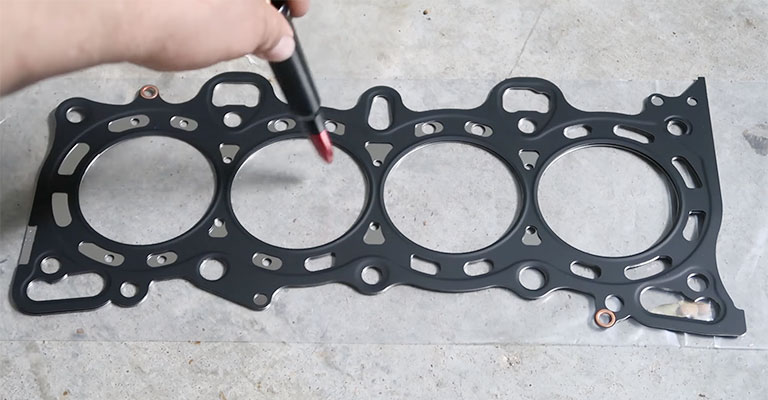
One of the many symptoms behind a blown head gasket is overheating. And because of head gasket failure, you might notice air bubbling in your coolant reservoir. Generally, white smokes come out of the exhaust pipe because of this head gasket failure.
The head gasket is supposed to flow coolant throughout the engine and hence prevent overheating. But as this component fails to do so, the engine might get heated, more than it should. And later on, this overheating leads to leakage.
As soon as you see unexpected white smoke coming out of the exhaust pipe, you should just immediately take the necessary steps. Otherwise, you might have a problem that is beyond repair.
Faulty Pistons or Rings
Usually, you will not have any leakage issues with your exhaust system if you have faulty pistons or piston rings. Not unless you have a blown head gasket or residual condensation in your exhaust system.
So when this problem occurs you will see gas coming out of your tailpipe along with water. And if the condition is serious, then the cabin can be filled with a burning smell. However, the head gasket failure and the faulty piston are related to each other. So while you fix the head gasket, it would be wise to replace the faulty pistons as well.
Faulty EGR Cooler
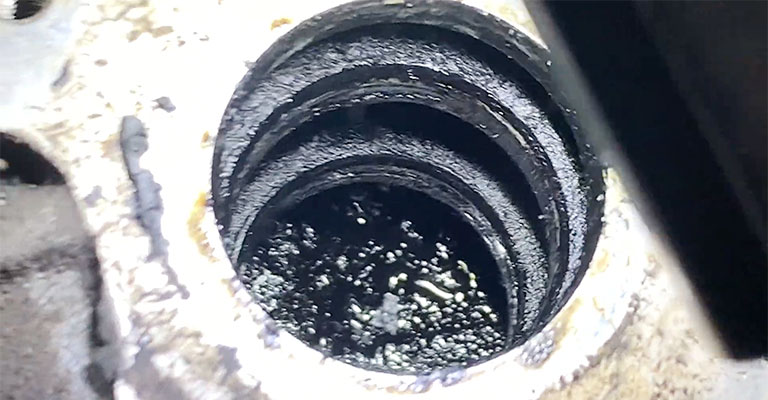
EGR cooler is now being used in some of the newer car engines, mostly diesel engines. And with this tool, the gases in the exhaust system get cooled down before getting into the intake. However, the EGR cooler system is not too rigid and tends to crack.
If the EGR cooler cracks, the coolant might come out of the exhaust pipe. And if this happens, the water coming out of the exhaust pipe might smell a little sweet.
How much does it cost to fix the exhaust water leakage issue
In most cases, the water leakage is caused by water condensation. And if that is the cause behind your particular problem, then you will not have to fix anything at all.
With that being said, if your head gasket is blown, or faulty piston or EGR cooler, that needs to be repaired or replaced immediately. Repairing the blown head gasket might cost within the range of 1 to 2 grands. And most of this money will be paid to the mechanic alone, as the process is long and critical.
And for replacing the piston or rings, you might have to spend around 1 to 5 grand. Just like the head gasket repair, the labor charges are high here as well.
Frequently Asked Questions
Do I have to change the engine if the exhaust leaks water?
No, if the leakage is caused by water condensation, then you do not have to change anything. But if the head gasket, pistons, or the EGR cooler is damaged, then take action immediately. Otherwise, the engine might get severely damaged as well. And then you would have to replace the engine.
How long does an exhaust condensation leak last?
To clear the water condensation, it might take the exhaust system from a few minutes to 20 minutes, if everything else is okay.
Conclusion
It is not necessary to worry about your car’s condition if you notice water leaking from your car exhaust. But there are some cases where taking the action as early as possible can save you thousands of dollars. And now that you know why my exhaust leak water, you would be able to track the problem properly.
Leave a Reply